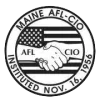Meet the Bangor Union Members Who Deliver Your Soda


Cliff Buzzell has been a union member all his life, from the time he got his first full-time job as a delivery driver for the Coca-Cola Northeast warehouse in Bangor at age 18 back in 1982. Coca-Cola Northeast employs over 50 members of United Food and Commercial Workers Local 1445, who work at the Bangor distribution center as sales reps, merchandisers, drivers and warehouse workers. If you live in Brewer, Bar Harbor, Ellsworth or the Blue Hill peninsula you may occasionally see Buzzell delivering Coke, Moxie, Sprite, Dr. Pepper, Snapple, Monster and other Coca-Cola products to your local supermarket.
“It’s not a bad job,” said Buzzell. “We’re the ones who deliver your soda and put it on the shelves.”
 In 1899, the Coca-Cola Company established a unique business model that the broader beverage industry eventually adopted. The company produced syrup at various regional plants and then partnered with hundreds of independent, often family-owned, bottling companies that would mix, bottle and distribute the soda across the country. In 1937, a former Coke advertising executive named Turner Jones founded Coca-Cola Bottling Plants Inc., which included plants and warehouses in South Portland, Sanford, Lewiston, Augusta, Bangor and Berlin, New Hampshire. In the late 60s, the Bangor plant ceased bottling and became solely a distribution warehouse.
In 1899, the Coca-Cola Company established a unique business model that the broader beverage industry eventually adopted. The company produced syrup at various regional plants and then partnered with hundreds of independent, often family-owned, bottling companies that would mix, bottle and distribute the soda across the country. In 1937, a former Coke advertising executive named Turner Jones founded Coca-Cola Bottling Plants Inc., which included plants and warehouses in South Portland, Sanford, Lewiston, Augusta, Bangor and Berlin, New Hampshire. In the late 60s, the Bangor plant ceased bottling and became solely a distribution warehouse.
Originally the company just sold Coke in 6.5 ounce bottles, but in 1955 Bangor became one of just two cities in the US to introduce the King Size (10- and 12-ounce) and Family Size (26-ounce) bottles. By 1967, it had expanded its line of beverages to include Sprite, Fanta, Fresca and Down East (a now-discontinued Maine line of sodas). By that time, Coke consumption in Maine and New Hampshire had increased from 3 and a half drinks per year in 1937 to 97.5 drinks for every man, woman and child. Today, total per capita consumption of sugar sweetened beverages in Maine is about 36 gallons per year, according to a recent study.
After Jones’ death, his company was sold in the early 1980s to the New Hampshire-based Coca-Cola Bottling Company of Northern New England. Then in 1988, that business was bought by the Japanese beverage giant Kirin, which moved the warehouse from Thirteenth Street to where it is now in the Dowd Industrial Park. Since then, it has grown to 16 distribution centers in all six New England states, as well as New York. In 2019, it changed its name to Coca-Cola Northeast to reflect its expanded distribution.
Buzzell says the biggest change he’s seen in his 40 years at the company is its transition from a more intimate environment to a more corporate atmosphere.
“It used to be that everybody was like family here, but now it’s corporate,” he said. “After the company bought up all those plants north of New York and New Jersey, we went under their system and now there are more employees from down there than there are here in little Maine.”
Workers at the Maine warehouses first got organized in the 1940s with the Teamsters but have been represented by the United Food and Retail Workers since Buzzell has worked there. As the shop steward, Buzzell says he strives to make new hires understand the value of their union and how it protects them from arbitrary firings and disciplinary actions while guaranteeing health coverage, vacations and seniority.
“I make sure they understand that if they get in trouble, they have the right to have a union rep go in with them so they’re not just by themselves with the manager,” he says. “The manager can’t just fire them just because they’re mad at them.”
As the only shop steward in the workplace, Buzzell says he’s been working on recruiting younger members, but it can be a difficult ask for new members who have been exposed to anti-union propaganda or want to move up to supervisory roles and are worried about offending management.
“When you join a union, you really need to ask a lot of questions like what your rights are and who your shop stewards and union reps are,” said Buzzell. “The biggest problem is when members don’t ask questions. Members also should make an effort to go to union meetings and become more involved in their union.”
